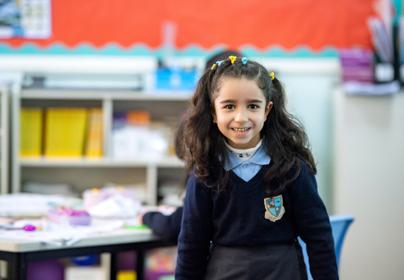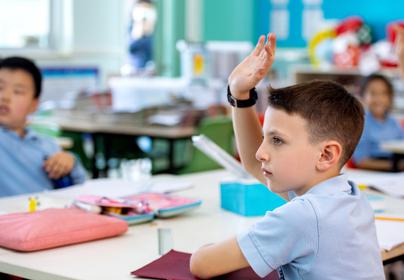Language development is one of the most important aspects of a child’s early education. From their very first words to the conversations they have with friends and teachers, language forms the foundation for learning, building relationships, and expressing ideas.
In the Early Years, children are rapidly expanding their vocabulary and beginning to use language in increasingly sophisticated ways. Through songs, stories, role play, and daily conversations, they learn how to express themselves, listen to others, and make sense of the world around them. These early language skills also lay the groundwork for later literacy, supporting reading, writing, and overall academic success.
Language, however, is more than just words. It is closely linked with children’s social and emotional development. When children are encouraged to share their thoughts and feelings, they build confidence and learn that their voice matters. Interactions with peers also help them to practise important skills such as turn-taking, negotiation, and empathy.
At school, we provide a language-rich environment where children are surrounded by opportunities to listen, speak, and communicate in meaningful ways. Story time, circle discussions, and imaginative play all encourage children to explore new vocabulary and develop their communication skills. Teachers model rich language, ask open-ended questions, and give children time to respond, ensuring every child feels heard.
A key part of our approach is the use of storytelling and structured language programmes. Through Talk for Writing, children internalise language patterns by learning and retelling stories before innovating and creating their own. This not only strengthens vocabulary and sentence structure but also builds confidence in expression. Similarly, Tales Toolkit allows children to use simple props to develop their own imaginative stories. By playing with character, setting, problem, and solution, children become storytellers themselves, laying a strong foundation for creativity, problem-solving, and early literacy.
By nurturing language in the Early Years, we are not only preparing children for academic achievement but also helping them to develop the skills they need to build relationships, solve problems, and confidently navigate the world. Language gives children the tools to think, imagine, and connect — skills that will support them throughout their school journey and beyond.
This week in Reception, the children have been using their communication skills to express what makes them happy. After reading the story My Friend is Sad, they reflected on the things that bring them joy and shared their ideas through drawings. We have also been listening to many stories and enjoyed discussing our thoughts and feelings about them. In maths, Reception have continued to strengthen their number knowledge by recognising, ordering, and writing numbers, as well as developing their understanding of number concepts. Through the story Big Bear Hug, the children also explored and observed trees, linking language with their observations of the natural world. In phonics, we focused on the sounds i, n and m.
Nursery have been reading the story How to Catch a Star. After listening, the children came up with their own imaginative ideas for catching a star. Some decided they would jump very high, while others thought about how they might fly. At the Art table, they extended this story by painting and decorating stars and moons to create a beautiful night sky collage. In maths, Nursery have been practising counting objects and learning the days of the week. The children have been excited to count from 1 to 10 and beyond through a range of activities, and it has been wonderful to see how quickly they are developing these skills and making confident guesses about what day it is.
In Pre-Nursery, the children explored emotions through the story The Colour Monster. Using our special plush characters, they began identifying and naming their feelings, which helped them to articulate emotions more confidently. They also experimented with colour mixing, blending primary colours to create new shades, and each child made their own Colour Monster to reflect an emotion. Outdoor play gave further opportunities for communication and collaboration as the children built and scooped in the garden, practising teamwork and learning how to ask to join in with friends’ play.
Sioned Jones
Head of Early Years




